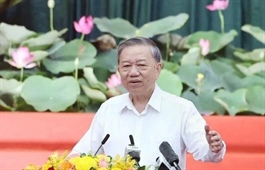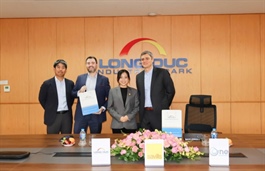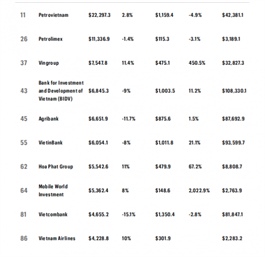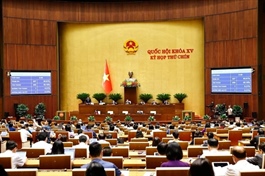Vietnamese press: from vision to action in a new era
Vietnamese press: from vision to action in a new era
With a number of pivotal socioeconomic policies in play, journalism is playing a growing role in Vietnam, helping to bring these policies into practice and turn the nation’s ambition into action for national advancement.
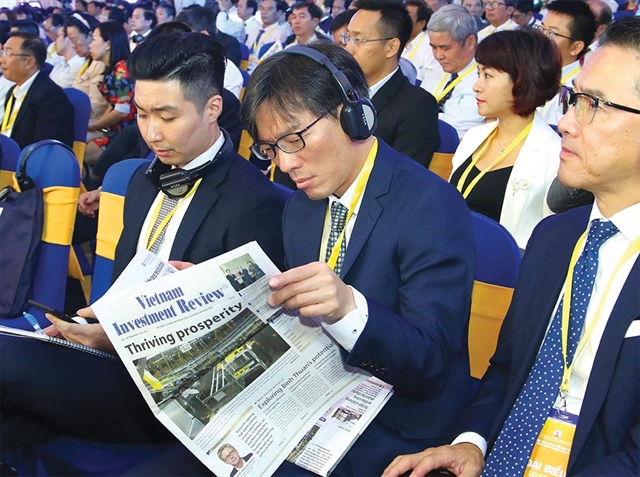
VIR seeks to engage with the business community. Photo: Le Toan |
Having worked as a journalist at a press office for about 10 years, Hang Pham has never experienced such a vibrant atmosphere among the business community as now, following the issuance of a number of major resolutions in recent months.
“I talked to many domestic and foreign-invested businesses in different industries about the new legislation. They are very hopeful and optimistic about their future prospects. Especially, they said that Resolution No.68-NQ/TW is an important turning point for the private sector. The move could create a big push for enterprises to grow in the future,” said Pham.
Resolution 68, issued on May 4, identifies the private sector for the first time as one of the most important driving forces of the national economy, targeting deep institutional reforms, and ensuring fair competition and contract enforcement.
Meanwhile, Resolution No.66-NQ/TW from April focuses on innovating law-making and law enforcement to meet the country’s development demands in the new era; and a December issuance, Resolution No.57-NQ/TW, centres on breakthroughs in the development of science, technology, innovation, and national digital transformation.
At a roundtable on the role of journalism held on June 9, Phan Xuan Thuy, deputy head of the Central Propaganda and Mass Mobilisation Department, said, “The performance of Resolution 68 will certainly bring about new difficulties. The press needs to boldly reflect them, proposing initiatives and solutions to contribute to perfecting policies, improving the business environment, and performing the functions and tasks of the press as a bridge between policies and life, and between the state, people, and businesses.”
The press plays a vital role in fostering a stable business environment, and supporting the country’s path toward comprehensive reform and development, Thuy added. “The press no longer follows policy but must go ahead to pave the way, create positive images and trust in society, as well as raise awareness of the role of the private economy,” said Thuy.
In this spirit, to bring the resolutions into practice effectively, journalists at VIR and elsewhere have engaged with the business community and written numerous articles, analysing the importance of the resolutions and the responses and expectations of enterprises.
The latest development is a talk show on the topic to be held on June 19 at VIR headquarters to mark 100 years of the Vietnamese revolutionary press, where major experts and businesses will share their viewpoints and related stories. Further coverage of Resolutions 57 and 68 will follow as part of a series.
Leaders said that Vietnam’s “era of national rise” is more than an aspiration – it is a strategic plan to accelerate economic growth, innovation, and global influence. By 2030, the country aims to be among the top three Southeast Asian nations in AI research, among the top 50 globally in digital competitiveness and e-government, and home to at least five world-class tech enterprises.
By 2045, it aims to be a leading digital technology hub in the region and the world, ranking among the top 30 in innovation and digital transformation.
“To break through stagnation and unleash Vietnam’s full potential, the country needs important drivers, including an enabling business climate backed by strong administrative reform, new supporting policies, and links like the press, thus leaping forward and realising the ambitious goals,” said Nguyen Duc Loi, vice president of the Vietnam Journalists Association.
He added that, with technological advancements and amendments to the Press Law, the Vietnamese press has more opportunities than ever to innovate and powerfully assert its role in the new era.
A more enabling environment for the press is on the way, as Vietnam is amending the Press Law to ensure a more open regulatory space for media development, encouraging multi-platform, multiservice models, and a media economy. It also aims to facilitate innovation to foster the press’s role as a bridge between the Party, the state, and the people.
|
Denny Abdi, Indonesian Ambassador to Vietnam The role of the press in today’s interconnected world is more crucial than ever, and VIR stands out as a valuable and respected publication in this landscape. We appreciate VIR for its consistently high-quality journalism - informative, in-depth, and forward-looking. Its visionary focus on important themes such as the green economy and sustainable development aligns well with global priorities. VIR has become a trusted channel for the exchange of ideas and provides insight on investment opportunities. Through publishing perspectives from global leaders, business communities, and ambassadors in Vietnam, VIR has positioned itself as a strong and credible partner for international counterparts, including Indonesia. I am confident that it will continue to contribute positively towards economic development and will serve as a bridge between Vietnam and Indonesia, as well as between Vietnam and its global partners, in promoting a more sustainable and prosperous future. |
- 14:00 19/06/2025








